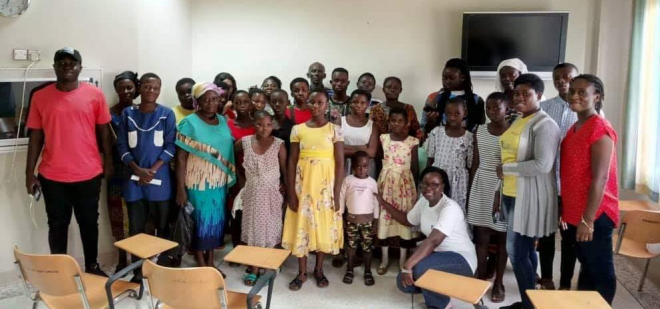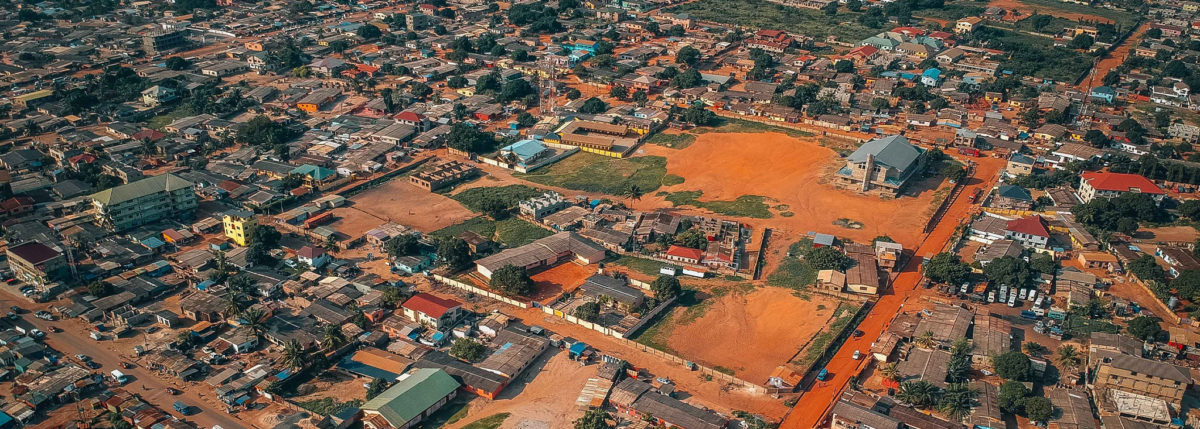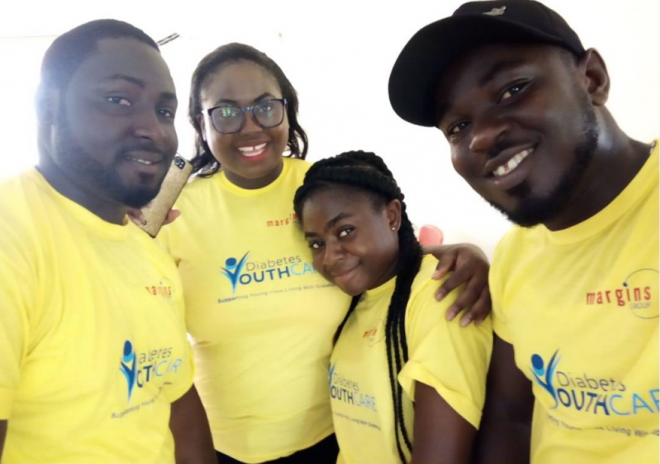Type 1 Diabetes in Ghana: A Global Community Discussion
This November, as part of a partnership between Type One Run and Diabetes Youth Care (DYC) Ghana, we gathered a group of type 1 diabetes (T1D) community members from around the world, with representatives from every continent, to learn more about type 1 diabetes in Ghana. This took place as a group chat on WhatsApp, where people beamed in from seven different time zones to connect with one another.
Ghana Quick Facts
- English-speaking West African country
- Population: 28.8 million
- Number of endocrinologists: fewer than 10
- 10 major regions
- Insulin (but not all types) is available through national insurance
- Other critical diabetes supplies are not covered: syringes, test strips, meters, etc.
- Standard type 1 diabetes regimen: 70/30 mixed insulin due to lack of access to testing supplies
 DYC Ghana
DYC Ghana
Diabetes Youth Care is an NGO focused on providing type 1 diabetes support in Ghana. It was founded in 2011 by Dr. Nana Ama Barnes, a doctor of internal medicine, and registered as a non-profit in 2012. DYC currently operates in five of the 10 regions of Ghana and is continuing to expand.
Nana is extremely approachable and down to earth, and despite her accomplishments she does not like to use her title, preferring to be called by her first name only. This humility carries over into her approach to running DYC: she teaches and empowers T1D youth to become “executives,” and they then become leaders in the organization themselves. This has proven to be an effective way to build a strong T1D network throughout the country.
According to Nana, “When a person is diagnosed with diabetes, follow-up is very important, as most times the news/diagnosis is overwhelming to the family, and most families will resort to ‘other’ treatment forms when they go back home. We realized that education has to start right there and so DYC encourages home visits soon after they get home! The young people in DYC visit these families and share their experiences and this encourages them to stick to the treatment modalities. Our social media platforms also make it easier for doctors from all over Ghana to send their patients to our support group for any needed help. We have a platform also for the parents so that they can support each other and share their difficulties especially psychological support.”
The chat was led by four such DYC youth executives: Yaa, Larsh, Kobby and Audrey. This allowed us to learn about T1D in Ghana directly from other people with type 1 living there.
Kobby summarized: “The aim is to educate and support young ones living with type 1 in Ghana. We have monthly meetings where we meet, educate ourselves and share our stories. We give supplies after each meeting which serves as a motivation for everyone.”
“We conduct home visits and we have a common platform where members all over Ghana can share their stories and ask necessary questions about their condition. Also, there are regional platforms with regional executives that help organize monthly support group meetings. We had our maiden camp in 2016 and it’s organized every year. All members in Ghana meet and interact with each other, share stories, have fun and learn,” added Larsh.
Who participated
As mentioned above, the chat was led by four DYC youth executives in Ghana. Audrey, Larsh, Yaa and Kobby have been living with T1D for 11, 8, 17 and 12 years respectively. Also joining were:
- Nana, founder of DYC
- Apoorva, doctor, member of DIYA in New Delhi, and Beyond Type 1 Global Ambassador
- James & Craig, co-founders of Type One Run
- Emma, founder of Type One Run London / Europe
- Bruno, activist and advocate, founder of Running for Diabetes in São Paulo
- Budoor, founder of Type One Run Al Khobar
- Rebecca, founder of Type One Run Wellington
- Mariam, founder of Type One Run London (Canada)
Everyone in attendance represented 157 years of living with type 1 diabetes.
The Healthcare System and T1D
According to the youth executives, most people with T1D in Ghana have never seen an endocrinologist. There are very few in Ghana—fewer than 10 in the whole country. They are located in urban areas, and they charge high prices. People with diabetes are typically seen by general physicians. Hospitals have special days for people with diabetes, and insulin is given out on insurance. Available insulins are Mixtard, Insulatard and Actrapid.
Individuals have to pay out of pocket for the cost of syringes, blood glucose monitors, test strips, HbA1c tests, medical checkups and other medications. For most people in Ghana, this is cost prohibitive and it is therefore simply not practical to check blood glucose multiple times a day. For this reason, standard treatment is 70/30 pre-mixed insulin once or twice per day. Generally, people in Ghana do not use insulin pumps or continuous glucose monitors (CGMs).
For the majority of people, by necessity, self-management is based on feel—if you feel the symptoms of high or low blood sugar, then you treat accordingly without having a number for your blood glucose level. Over time, those symptoms fade, affecting peoples’ ability to treat effectively. “I didn’t have the usual symptoms of hypo, at some point I had paralysis when I had hypo,” shared Yaa, “so it’s very dangerous.”
“Very dangerous,” agreed Larsh. “Lots of people just pass out because they can’t sense the symptoms.”
“We are unable to do carb counting because of the nature of our foods,” explained Audrey. “And protein diets are also expensive, so we do more carbohydrates.”
“Our foods are mostly carbohydrates so we record high blood sugar at most times. As for exercise, the common one is walking because most gyms are expensive,” continued Larsh.
“True bro. And jogging,” Kobby added. Hopefully, Type One Run will take off in Ghana and running can be added to the list.
Social implications and stigmatization
According to Yaa, “Due to the cost, families are forced to choose between education or health.”
“…or food” added Nana.
Larsh continued, “Due to the high cost of managing the situation, and stigmatization, it becomes a major problem for families, especially for families that are not well to do. Imagine a family that is not well to do and they have five children with one who has diabetes. They find it difficult channeling all the money to cater for the health of the child with diabetes and finally he/she must drop out for them to cater for the rest.”
This means that T1D can cause tremendous family tensions, resulting in a loss of education and even abandonment and social isolation.
According to Kobby, in general, most Ghanaians will “seek spiritual help first, and if that doesn’t work, then they rush to the hospitals.” This is the inverse of the Euro-American approach, in which conventional biomedicine is prioritized over any alternative.

In Ghana, diabetes is generally viewed as a spiritual disease. Yaa explains, “It’s spiritual, so you are expected to see a pastor but when you are seen going for alternative medicine (insulin), in their view, you accepted the condition and you are not a believer.”
This means that people often forego insulin in favor of herbal medicine, and “take in anything they hear can cure the condition because of the depression and frustration of living with the condition,” says Larsh. “That’s one of the major causes of death of people with diabetes in Ghana.”
Responding to what he felt was the biggest challenge to tackle, Larsh contemplates, “Even if there is education, social support will determine the manner of management and you know we can’t do away with the supplies too. So, it’s like the trinity.”
It’s not a simple matter of access to supplies, or education, or social support. Diabetes is a complicated and dangerous disease, and all of these things are intertwined. There is no simple solution, all of these factors and more must be considered in order to tackle the problem in a meaningful way.
The Future
Speaking with the DYC youth executives in Ghana was incredibly inspiring. It’s a testament to the power of the type 1 community in all parts of the world, and the impact that each of us can have by becoming advocates for one another.
It is also an example of how the T1D community is using modern technology to connect and improve one another’s lives. WhatsApp allowed us to have a group of T1D’s from every corner of the globe communicate and learn about Ghana in real time. But it also allows Ghanaians from every part of the country connect, share and support one another, even if they may be alone or many miles from another person with type 1 diabetes in a similar situation.
Kobby’s story of how he met Nana illustrates the power of social media and DYC. He found a page for a diabetes group on Facebook and asked a question about accidentally freezing his insulin to whoever would listen. It was Dr. Barnes who helped him understand that freezing insulin would actually negate any of its effects and that his everyday shots were simply not working.
These young men and women are sharing, learning, empowering themselves and empowering others. They have made themselves pillars of an organization that provides all the elements of the “trinity” that Larsh described above: medical supplies, education and social and psychological support.
Donations can be made to help DYC Ghana here.


 DYC Ghana
DYC Ghana


